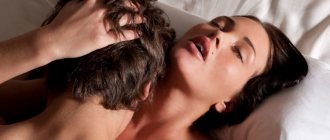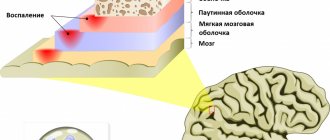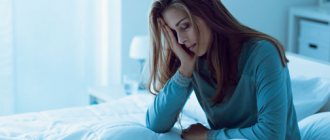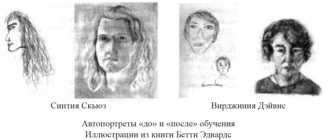Causes of the condition
To understand what to do if you have a headache in the morning, you need to determine the cause of this condition. An unpleasant sensation occurs due to muscle strain or the influence of blood vessels on the nerve endings in the head. This does not necessarily accompany diseases or pathologies. Sometimes physiological reasons lead to this.
Factors predisposing to morning headaches:
- lack of sleep - sleeping less than 6 hours increases the chances of discomfort upon waking up;
- unsuitable pillow - disrupts blood flow in the neck, which affects the flow of oxygen to the brain;
- uncomfortable sleeping position - pain moves from the muscles to the head;
- excess alcohol and other psychotropic substances - morning pain is typical for people who abuse alcohol;
- Taking certain medications —anti-anxiety medications sometimes cause headaches.
Causes
Morning headache is a direct consequence of a significant change in the tone of the walls of blood vessels in the brain (spasms).
The most common causes of morning headaches that require treatment include:
- physical stress;
- psycho-emotional overload (stress);
- dehydration;
- errors in diet and nutrition;
- habit of drinking large amounts of coffee;
- sleep disorders;
- excessively long night sleep;
- uncomfortable posture during sleep;
- abuse of pharmacological drugs with a hypnotic effect;
- consumption of nicotine and alcohol.
Please note: Many women suffer from headaches in the morning if they fall asleep the night before with a significant amount of styling products on their hair. Varnishes and gels often contain toxic compounds that can penetrate the scalp and provoke cerebral vascular spasms. In people with nicotine addiction, blood vessels are almost constantly in a state of spasm, which inevitably leads to headaches. Alcohol has no less destructive effects on the body - even in relatively small quantities it poisons the body, provokes dehydration (dehydration) and morning headache (one of the main symptoms of a hangover).
If you consume a significant amount of “heavy” food at night, then instead of proper rest, the body is forced to expend energy on digesting food. Overeating is another of the most common causes of headaches in the morning, its treatment at the initial stage is very simple - just stop eating at night and the excruciating pain will stop on its own.
Sleep disorders include:
- snore;
- night apnea (stopping breathing);
- insomnia;
- involuntary movements during sleep;
- nightmares.
What diseases does it occur with?
The problem cannot always be solved by establishing a routine and giving up bad habits. Sometimes morning headaches are the result of illness. Then the condition requires treatment and observation by a specialist.
Possible diseases:
- apnea - stopping breathing and snoring interferes with oxygen saturation of the brain, which is why headaches appear;
- pathologies of the cardiovascular system - there is a disruption in the blood supply to the brain or an increase in pressure;
- oncological brain damage - benign and malignant neoplasms;
- traumatic brain injury - concussion or contusion of the brain;
- stroke - bleeding in the brain;
- Bruxism - excessive tension of the jaw muscles, which leads to teeth grinding at night;
- depression - can manifest itself not only as a deterioration in mood, but also apathy, drowsiness and headaches;
- anxiety disorder - constant tension in the nervous system and the inability to relax even in sleep leads to a worsening of the condition in the morning;
- migraine - pain that is aggravated by light and sound and has a characteristic aura.
Read also: Pain in the back of the head
Most pathologies require treatment and observation by a doctor. Laboratory and instrumental examination methods, as well as examinations by specialists, make it possible to establish a diagnosis.
Pathological causes of headaches
A common cause of nighttime headaches is oxygen deficiency. It may be caused by abnormalities of the nasal passages and respiratory tract diseases. Night headaches occur after sleep apnea.
Blood supply to the brain is impaired during hypotension. The outflow of venous blood worsens due to a decrease in the tone of the intracranial veins. In the morning the patient feels it in his head.
With arterial hypertension, blood pressure may increase during sleep. The reason is the patient’s age, disruption of sleep and rest patterns. Vascular tone is impaired in diseases of the thyroid gland and heart. Nocturnal hypertension is dangerous for the development of heart failure and stroke. Headache occurs at night or in the morning.
Stress, anxiety, and mental trauma affect the central nervous system and change vascular tone. This provokes an increase in blood pressure and irritation of pain receptors in the walls of blood vessels. Night headaches that occur under the influence of psychogenic factors are varied in nature. They are accompanied by irritability, rapid heartbeat and are not relieved by analgesics.
Diseases of the cervical spine and temporomandibular joint can provoke night headaches. With back pain, a person is forced to take an uncomfortable position, which causes spasms of the neck muscles. They cause headaches.
Failure to comply with the dosage of glucose-lowering medications or refusal to eat dinner in diabetes mellitus results in a sharp decrease in blood glucose levels and severe headaches. Histamine disease is characterized by prolonged attacks of acute headache in the orbital area in the evening and at night.
In the presence of brain tumors, patients complain of night and morning headaches. As the disease progresses, it intensifies. The head hurts when changing position, the patient's hands go numb.
Throbbing morning headaches are felt during migraines. They often intensify when the light is turned on and are accompanied by nausea and vomiting. Constant headaches that bother the patient night and day are characteristic of brain infections.
When to see a doctor
If the headache appears one-time or has objective causes, you can cope with it yourself. For this there are analgesics - Nurofen, Analgin, Ketorol. You can take them no more than 2 times a week. If this does not help, you need to think about going to a specialist.
Signs that you need to see a doctor:
- The pain occurs more often than 2 times a week.
- This was not observed before, but now headaches often occur, especially in people over 50 years of age.
- The attack is accompanied by stiffness in the neck.
- There was a head injury or a situation in which it could have been caused.
- In addition to pain, the person has nausea, fever, vomiting, but there are no acute respiratory viral infections or other diagnosed infections.
- The attack is accompanied by loss or clouding of consciousness, double vision.
If you have headaches, you should consult a therapist or a neurologist immediately. The doctor will order an examination and find out the cause of the condition, and also select the right treatment.
Independent attempts to get rid of pain can lead to complications in the gastrointestinal tract due to painkillers, as well as to aggravation of the underlying disease.
Dear patients! Remember that only a qualified doctor can make an accurate diagnosis, determine the causes and nature of the disease, and prescribe effective treatment. You can make an appointment with our specialists or call a doctor at home by calling 8-(4822)-33-00-33
Be healthy and happy!
Why I have a headache in the morning: 5 common reasons
Headaches are often caused by not drinking enough fluids during the day or not getting enough sleep. But sometimes this unpleasant condition in the morning has more serious reasons, writes medikforum.ru.
Migraine. According to Cleveland Headache Center physician Jennifer Crigler, the period between four and nine in the morning is the time for morning migraines. During these hours, the body produces fewer endorphins and enkephalins, which act as natural pain relievers. In addition, increased amounts of adrenaline are released in the early morning. This increases your blood pressure and can result in headaches.
Advertising
Photo: pixabay.com
Sleep apnea syndrome. Because of it, a person’s breathing is repeatedly interrupted. The consequence of such pauses in breathing during sleep is hypoxia and increased pressure, which is why headaches develop.
Studies confirm the connection of sleep apnea with strokes, heart attacks, hypertension, heart rhythm disturbances, atrial fibrillation, and ischemia. It is difficult to determine apnea on your own, but its characteristic sign is fatigue, which is felt despite prolonged sleep.
Serious health problems
Headaches can be a symptom of serious health problems, including a brain tumor, injury, high blood pressure, or stroke. This type of headache is called secondary.
Here are situations when you should see a doctor.
- Headache occurs twice a week or more often.
- Previously, my head didn’t hurt, but now it hurts often. This is especially dangerous if you are over 50.
- A sharp, severe pain and stiffness appears in the neck.
- The headache appeared after a head injury.
- Along with the headache, high fever, nausea, and vomiting appear, and this is not explained by another disease.
- The headache is accompanied by clouding or loss of consciousness, weakness, and diplopia (you see double).
- The nature or severity of pain changes dramatically.
- Chronic headaches appear in a child.
- The headache is accompanied by cramps or shortness of breath.
- Frequent headaches occur in those who have HIV or cancer.
How to fix it?
If you have a headache after a nap, what should you do? If you still had to rest during the day, then there are ways to eliminate the discomfort. They are non-medicinal and with the use of drugs. Each person can choose the most acceptable types of relief from an uncomfortable condition.
Non-drug treatment is as follows:
- A head and neck massage is performed. Rubbing and stroking movements are necessary, which restore blood circulation in the problem area, ensure the supply of oxygen to the brain, and lead to muscle relaxation. Over time, the unpleasant sensations of pain disappear.
- Breathing exercises are effective. It needs to be done in the fresh air. Thanks to full and deep inhalations and exhalations, the body will be saturated with oxygen and eliminate carbon dioxide. This provides nutrition to the brain cells, and therefore the headache disappears.
- Carry out standard charging. Since headaches often occur in conditions where it is difficult to perform massage or breathing exercises, regular exercise will do. With its help, blood circulates throughout the body, tense muscles relax and well-being returns to normal.
- If an uncomfortable state appears at home, after a working day, then a contrast shower will do. Temperature changes are aimed at improving blood circulation in the neck and head. In addition, massage movements with water jets also have a positive effect.
How to get rid of morning headaches
- Medicines. Doctors mainly prescribe painkillers and anti-inflammatory drugs. If headaches after sleep are associated with muscle tension, antispasmodics or muscle relaxants are used. For high blood pressure, antihypertensive drugs are used. Viral and bacterial infections are treated with antiviral and antibacterial drugs, respectively.
- Massage. Increases blood flow in the muscles of the neck and back of the head, which helps relieve pain.
- Manual therapy. Realigning the vertebrae can help with headaches. Only qualified doctors prescribe and perform the procedure.
- Physiotherapy. If headaches in the morning are not associated with serious pathologies, low-intensity training with an emphasis on the neck muscles can help.
- Acupuncture. Targeting acupuncture points in the back and neck can help relieve headaches after sleep.
If you experience frequent headaches, consult a specialist








